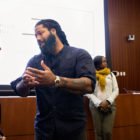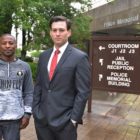
Diversion, Positive Youth Development, Restorative Practices: Connecting the Dots
|
“Effective, evidence-based practices that support the wellness and resiliency of youth in school and in the community are emerging.” —Models for Change (2010)
Juvenile Justice Information Exchange (https://jjie.org/author/jjie-org/page/26/)

“Effective, evidence-based practices that support the wellness and resiliency of youth in school and in the community are emerging.” —Models for Change (2010)

Neighborhood conditions like exposure to violence are unacceptable, and undoubtedly create numerous negative outcomes. However, there are additional factors that consistently show up for youth involved in gun violence that are often not seen as important to stopping gun violence, and thus are overlooked in policy solutions.

In 2007, I gave someone a second chance. I was in Danbury (Conn.) Federal Correctional Institution recruiting women for a new program for people returning from prison that I was running in New York City.

Over the last several years, the Juvenile and Domestic Relations District Court (JDRDC) of Fairfax County, Va., has been working on transformative efforts around juvenile justice in an effort to keep low-risk youth from entering the system and address disparities for youth of color. One large area targeted by these efforts was the diversion programming and Juvenile Intake Office.

Christina Young remembers the day the cops came for her at school.
She was fifteen years old -- a sophomore at Murry Bergtraum High School for Business in lower Manhattan. She and four of her friends were sitting together at a table in the school’s large and chaotic cafeteria.

When the moderator informally polled the audience at a criminal justice discussion held at the New York Law School on whether probation and parole should be abolished, almost half the audience — mostly criminal justice practitioners and stakeholders — raised their hands.

Mayor Randall Woodfin says Birmingham is ready for peace.
With a call for communitywide investment, the mayor says it’s time for solutions — “not programs” — for a city long plagued by violence.

When you are trying to make the shift to a restorative justice mindset, having even a few teachers, support personnel or administrators giving push-back can be downright exhausting.

Today, as the mayor of Birmingham, Woodfin is calling for a communitywide commitment to end gun violence. It’s a city long plagued by trauma in a state named by the CDC as the second deadliest in the nation for rate of firearm deaths.

Michael Mills had run-ins with the law in his younger, wilder days. Now he is 43, an automotive repairman and father of four who lives in Baldwin, Fla., a quasi-independent municipality in Jacksonville. He thought that was all far behind him until he was arrested in September 2018 on felony charges of impersonating a police officer.